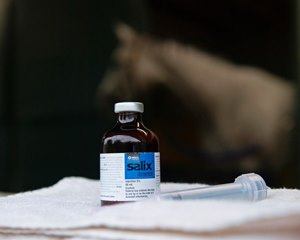In Reversal, KY EDRC Votes for Partial Lasix Phaseout


In a reverse decision of its last meeting, the Kentucky Equine Drug Research Council Nov. 25 voted 6-2 to phase out the use of race-day Lasix in 2-year-olds beginning in 2020 and in stakes races beginning in 2021.
The EDRC, which makes medication rule recommendations to the Kentucky Horse Racing Commission, previously opposed the proposal—which has the support of the state's tracks—by a 5-3 vote (with one member absent) at its Oct. 28 meeting. Three members requested a follow-up meeting on the proposal to allow for the review of additional information. Back at the KHRC office in Lexington Monday, multiple EDRC members said they felt differently about the proposal with more details in front of them.
The proposal would still allow for horses to receive furomeside (also referred to as Lasix, or Salix) 24 hours or more before post time of the race in which a horse in entered, Dr. Bruce Howard, the KHRC's interim equine medical director, explained Monday. Administration at least 24 hours out would be performed by a trainer's private veterinarian, and the horses participating in races free of race-day Lasix would be required to be on the grounds of which they are running a minimum 24 hours in advance of post time.
Also Monday, the Grayson-Jockey Club Research Foundation in a release said it believes the results of a recent study suggest administering Lasix more than 24 hours out can be effective in preventing EIPH. The release came out while the EDRC meeting was taking place. The study was published in the Journal of Veterinary Internal Medicine and funded by the Grayson-Jockey Club Research Foundation. The administration of Lasix by a state veterinarian four hours out from post time is the current standard.
Study Finds Promise in Administering Lasix 24 Hours Out
Dr. James Morehead (representing veterinarians on the council), Dr. Johnny Mac Smith (Thoroughbred breeders), Sen. Damon Thayer (legislators), Churchill Downs executive Mike Ziegler (licensed racing associations), Art Zubrod (Standardbred breeders), and chairman Dr. Stuart Brown voted in favor of the proposal Monday.
Dr. Smith, who along with Dr. Morehead changed his vote, said he felt those both for and against the proposal at the Oct. 28 meeting were operating out of fear and that further discussion was needed. Zubrod was unable to attend the last meeting.
"On one end we had a fear of removing race-day Lasix from the horse and what that was going to do. On the other end we had a fear of what the optics were going to be if we didn't. ... What we were presented with was a proposal that lacked the detail that I've been given today," Dr. Smith said. "There was not much discussion on the regulatory aspects or any of the mechanics on how this was going to be done. It was just a statement of, 'This is what we propose.'"
Dr. Marc Cheney (representing Thoroughbred horsemen) and Dr. Andy Roberts (Standardbred horsemen) voted against the proposal. Both expressed concerns about Exercise Induced Pulmonary Hemorrhage and horses bleeding in the middle of a race. Dr. Roberts also compared the proposal as "throwing a bone" to the animal rights groups protesting horse racing and said they would not go away.
Dr. Michael Kilgore (representing pharmacologists) was unable to attend Monday, but in an email to Dr. Howard that was read to EDRC members, Kilgore said he would review Monday's discussion and remain open-minded on the issue. Kilgore also expressed in his email that he did not believe the full scientific discussion on race-day Lasix was held at the Oct. 28 meeting in order to make a critical vote.
Early in the meeting Ziegler noted 83% of Churchill Downs' races would still be able to be run with race-day Lasix under this proposal. The proposal considered by the EDRC is supported by all of the Kentucky Thoroughbred tracks, as well as the Red Mile, as outlined in an Aug. 11 letter to KHRC general counsel John Forgy.
In April, Churchill Downs and Keeneland were among a coalition of tracks that announced they would be applying those same rules. The Aug. 11 letter also included Ellis Park, Kentucky Downs, and Turfway Park.
As in the last meeting, Sen. Damon Thayer said he would like to see Kentucky be the leader on the proposed Lasix changes and work with other states to adopt the same policy in hopes of keeping the Horseracing Integrity Act of 2019—federal legislation that would see the United States Anti-Doping Association take the lead on medication oversight for the sport throughout the U.S.—from passing. He also noted his position on the Horseracing Integrity Act relied on action at the state level.
"I will be open to the possibility of supporting that and going to congressman (Andy) Barr, and going to (senate majority) leader (Mitch) McConnell, and throwing my support behind that if the states can't get their act together and move forward on this," Thayer said. "I believe Kentucky should lead and I believe this is a huge step in the right direction toward leadership."
